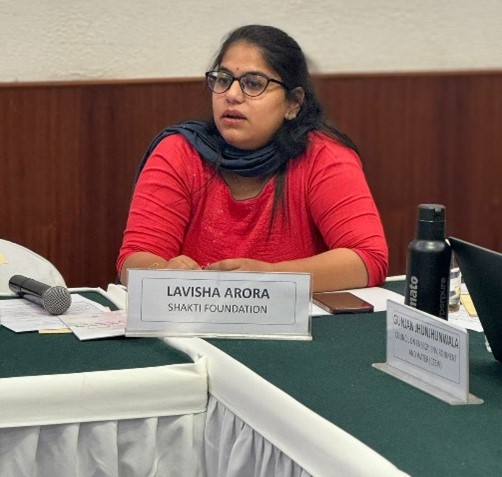 Roundtable on ‘Climate Change and Future of Women’s Work’, organised by Institute for What Works to Advance Gender Equality (IWWAGE)
Roundtable on ‘Climate Change and Future of Women’s Work’, organised by Institute for What Works to Advance Gender Equality (IWWAGE)
Shakti Sustainable Energy Foundation participated in a roundtable on ‘Climate Change and Future of Women’s Work’ organised by Institute for What Works to Advance Gender Equality (IWWAGE) on June 6, 2024, in New Delhi.
 Lavisha Arora, Senior Programme Manager, Climate Finance, Shakti, at the Roundtable on ‘Climate Change and Future of Women’s Work
Lavisha Arora, Senior Programme Manager, Climate Finance, Shakti, at the Roundtable on ‘Climate Change and Future of Women’s Work
Lavisha Arora, Senior Programme Manager, Climate Finance, Shakti said “In order to enhance the women’s access, knowledge, and climate partnerships, with the dual aim of promoting women in climate finance and greening the Indian financial system, Greening of Finance by Women (GroW) was launched, as part of GIFS initiative co-partnered by SIDBI(Small Industries Development Bank of India), Shakti and Agence Française de Développement. One of the flagship initiative under the GroW is Investor-Women Entrepreneur Matchmaking series which aims to connect Women Entrepreneurs working in climate solutions with relevant Capital Providers to increase the number of women’s in leadership roles in green and climate finance.”
The discussion covered climate change as a pressing global challenge, disproportionately affecting women, girls, and marginalised communities. The UNFCCC CoP28 highlighted the need for gender-responsive climate action and addressing gender disparities in climate policies. The Government of India (GoI) is implementing several programs, including the National Action Plan on Climate Change (NAPCC), to promote low-carbon, climate-resilient development. Initiatives like the National Mission on Sustainable Agriculture and the National Solar Mission incorporate gender considerations to ensure women’s participation in sustainable development. The 2023 G20 Summit’s New Delhi Leaders Declaration underscores the importance of increased financial support and women’s leadership in climate action.
Towards a Gender-Responsive Climate Transition: An Overview of the Existing Landscape
Women, especially in slow-wage growth industries like construction and textile production, dominate the informal economy, accounting for 92% of female employment, with limited access to education and career opportunities. Climate change exacerbates these gender disparities, particularly in agriculture and informal sectors, highlighting the need for targeted interventions. Traditional gender norms and responsibilities further restrict women’s participation in decision-making and development opportunities. A gender-based approach is essential for job creation in emerging sectors. Key focus areas include promoting women-led climate action, bridging gender gaps in green sectors, and inclusive skill development initiatives.
